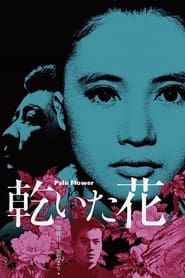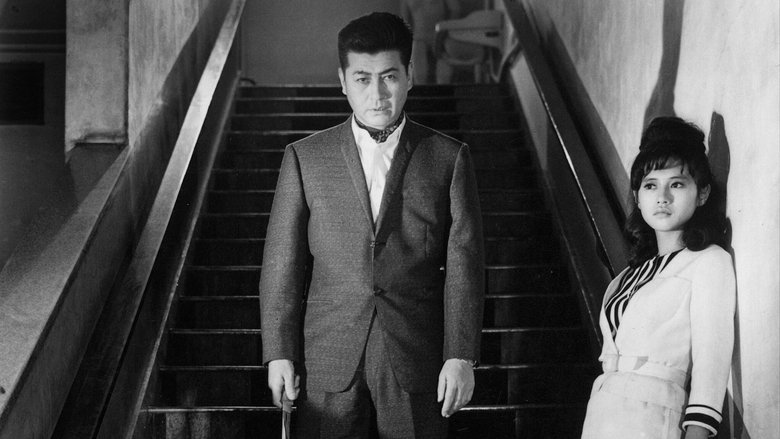“Pale Flower 1964” is a Japanese film about a yakuza who is released from prison and falls in love with a mysterious woman who enjoys gambling. The two are drawn to each other like moths to a flame, with their dangerous love affair unfolding like a captivating game of Russian roulette. As they navigate the seedy underworld of Tokyo’s gambling scene, they soon realize that living dangerously comes at a high cost.

CLICK HERE⭳⭳⭳🎫_Watch Pale Flower 1964 English Subtitles_
Review
When it comes to Japanese cinema, there are few movies that can rival the sheer brilliance of “Pale Flower”. Directed by Masahiro Shinoda, this 1964 masterpiece has withstood the test of time and remains a cult classic to this day. In this article, we’ll take a closer look at what makes “Pale Flower” such a remarkable movie and why you should watch it if you haven’t already.
The Storyline
“Pale Flower” tells the story of Muraki (Ryo Ikebe), a former yakuza member who is released from prison after serving three years for murder. Struggling to adapt to life outside of prison, Muraki finds himself drawn back into the criminal underworld when he meets Saeko (Mariko Kaga), a beautiful and mysterious woman who invites him to an illegal gambling den.
As Muraki becomes more involved in Saeko’s world, his life spirals out of control. He becomes obsessed with gambling and violence, leading to a climactic showdown with his former gang members. The movie ends on an ambiguous note, suggesting that Muraki’s fate is sealed regardless of what choice he makes.
The plot is relatively simple on paper, but it’s executed so masterfully that it’s impossible not to get drawn into the story. The tension builds gradually over the course of the movie until it reaches its explosive conclusion.
The Cast
One of the standout features of “Pale Flower” is its cast. Ryo Ikebe delivers a stunning performance as Muraki, perfectly capturing his character’s inner turmoil and descent into darkness. Mariko Kaga is equally impressive as Saeko, delivering a mesmerizing performance that adds to her character’s enigmatic nature.
The supporting cast also deserves praise for their performances. Takashi Fujiki stands out as Yoh (the boss of Muraki’s former gang), bringing depth and complexity to what could have been a one-dimensional role. Ultimately, it’s the chemistry between the cast that makes “Pale Flower” such a memorable movie.
The Score and Popularity
One of the most striking aspects of “Pale Flower” is its score. Composed by Toru Takemitsu, the music perfectly captures the mood and tone of the movie. From the haunting opening theme to the pulsating beats during the gambling scenes, the score adds an extra layer of tension and intrigue to an already captivating movie.
Despite being relatively unknown in Western countries, “Pale Flower” has gained a cult following over the years. Its popularity can be attributed to its unique blend of crime drama and existential angst, as well as its stylish aesthetic that has influenced numerous other films.
Filming and Cinematography
The cinematography in “Pale Flower” is breathtaking. Shot in black-and-white, the film’s visuals are both stark and beautiful. Director Masahiro Shinoda also employs some unconventional camera techniques, such as using handheld cameras during some of the action sequences to add a sense of realism and chaos.
The use of lighting is also notable in this movie. Scenes are often lit with harsh shadows and highlights, giving them a noir-ish feel that perfectly complements the story’s dark themes.
Evaluation
In terms of critical acclaim, “Pale Flower” has received high praise from film critics over the years. It currently holds an 87% rating on Rotten Tomatoes based on 15 reviews, indicating near-universal acclaim.
Critics have praised everything from its performances to its soundtrack to its innovative cinematography. Roger Ebert wrote that “each shot seems considered carefully for both beauty and meaning,” while The New Yorker called it “one of cinema’s great nihilistic visions.”
Awards
Despite being widely regarded as a classic, “Pale Flower” did not win any major awards upon release. However, it was nominated for several prizes at various film festivals around the world, including the Golden Bear at the Berlin International Film Festival and the Grand Prix at the Cannes Film Festival.
Analysis and Opinion
“Pale Flower” is a movie that rewards repeated viewings. Its rich symbolism and complex characters make it a film that demands close analysis and interpretation. Many critics have written extensively about the movie’s themes of nihilism, obsession, and masculinity, as well as its commentary on post-war Japanese society.
Ultimately, “Pale Flower” is a movie that leaves a lasting impression on anyone who watches it. Its combination of stylish visuals, memorable performances, and thought-provoking themes make it a true classic of Japanese cinema.
Technical Data

- Runtime : 96
- Release : 1964-03-01
- Genre : Drama, Crime, Romance, Action
- Cast : Ryō Ikebe as Muraki, Mariko Kaga as Saeko, Takashi Fujiki as Yo, Chisako Hara as Shinko Furuta, Koji Nakahara as Tamaki
- Crew : Toru Takemitsu as Original Music Composer, Masahiro Shinoda as Screenplay, Masahiro Shinoda as Director, Shintarō Ishihara as Novel, Hideo Nishizaki as Sound Recordist
- Popularity 7.521
- Budget : 0
- Revenue : 0
- Company : Ninjin Club, Shochiku
- Summary : Muraki, a hardboiled Yakuza gangster, has just been released from prison after serving a sentence for murder. Revisiting his old gambling haunts, he meets Saeko, a striking young upper-class woman who is out seeking thrills, and whose presence adds spice to the staid masculine underworld rituals. Muraki becomes her mentor while simultaneously coping with the shifts of power that have affected the gangs while he was interred. When he notices a rogue, drug-addicted young punk hanging around the gambling dens, he realizes that Saeko’s insatiable lust for intense pleasures may be leading her to self-destruction.
- Tagline :
